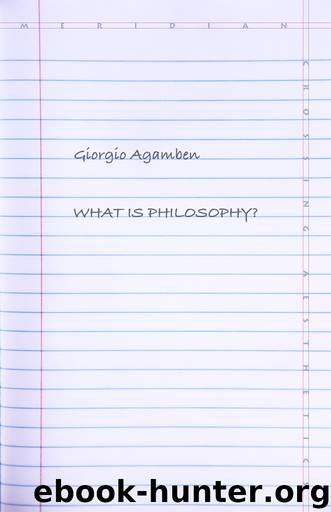What Is Philosophy? by Giorgio Agamben

Author:Giorgio Agamben [Agamben, Giorgio]
Language: eng
Format: epub
Publisher: Stanford University Press
Published: 2017-04-14T16:00:00+00:00
On Writing Proems
In the Third Letter (316a), Plato states that he “gave a fair amount of attention to the proems to the laws [περὶ τῶν νόμων προοίμια σπουδάσαντα μετρίως].” That he is referring to an actual act of writing is confirmed, since he adds: “I am told that some of you afterwards revised my proems, but the difference between these two parts [that written by Plato and that revised by others] will be evident to those who are competent to recognize my style [τὸ ἐμὸν ἦθος].” If we consider that, in the Seventh Letter, Plato seems to suspect all attempts at writing philosophical arguments to be insufficiently accurate (which could equally apply to his own dialogues), he may have regarded the drafting of those proems (which, he asserts, were unmistakably his work) as one of the few serious acts of writings he produced in his long life. Unfortunately, these writings have been lost.
In the Laws, one of his late works, playing on the double meaning of νόμος (“musical composition sung in honor of a god” and “law”), Plato returns to the problem of the proems to the laws (and this makes us believe that the letter is authentic). The interlocutor of the dialogue designated as “the Athenian” says:
Every discourse and everything in which the voice participates has proems [προοίμιά] and tunings-up [ἀνακινήσεις], as one might call them, which contain a kind of attempt at beginning in conformity with the art [ἔντεχνον], and assist toward what will follow. Indeed, admirably elaborated proems precede even the so-called citharoedic νόμοι and musical compositions of every description. But for the actual νόμοι [that is, the laws], which we designate as “political,” no one has ever started by making a proem, or, having composed it, brought it to light, just as though this would not conform to nature. But, in my opinion, the conversation we have had proves that it does conform to nature and that the laws we were then speaking about [those pertaining to free men], which seemed to me to be double, are not simply such, but are two things: laws and proems to the laws. The tyrannical commandment [ἐπίταγμα], which we have compared to the prescriptions of those doctors we called not free, is indeed pure law [ἄκρατος, unblended]; the part which precedes this, which we have called the persuasive [πειστικὸν] element, insofar as it is used to persuade, has the same function as the proems one makes in discourses. The entire discourse the lawgiver makes trying to persuade seems to me aimed at preparing the one to whom he addresses the law to benevolently accept his commandment, that is, the law. Hence the right term for it would be “proem” [προοιμίον] and not “discourse” [λόγος] of the law [. . .]. The lawgiver must take care of furnishing proems before every law and for each of them, whereby they differ from each other like the two laws of which we spoke earlier. (722d–23b)
The allusion to discourse in general (“everything in
Download
This site does not store any files on its server. We only index and link to content provided by other sites. Please contact the content providers to delete copyright contents if any and email us, we'll remove relevant links or contents immediately.
| Books & Reading | Comparative Literature |
| Criticism & Theory | Genres & Styles |
| Movements & Periods | Reference |
| Regional & Cultural | Women Authors |
4 3 2 1: A Novel by Paul Auster(12362)
The handmaid's tale by Margaret Atwood(7747)
Giovanni's Room by James Baldwin(7313)
Asking the Right Questions: A Guide to Critical Thinking by M. Neil Browne & Stuart M. Keeley(5751)
Big Magic: Creative Living Beyond Fear by Elizabeth Gilbert(5739)
Ego Is the Enemy by Ryan Holiday(5406)
The Body: A Guide for Occupants by Bill Bryson(5070)
On Writing A Memoir of the Craft by Stephen King(4924)
Ken Follett - World without end by Ken Follett(4715)
Adulting by Kelly Williams Brown(4560)
Bluets by Maggie Nelson(4541)
Eat That Frog! by Brian Tracy(4509)
Guilty Pleasures by Laurell K Hamilton(4435)
The Poetry of Pablo Neruda by Pablo Neruda(4087)
Alive: The Story of the Andes Survivors by Piers Paul Read(4014)
White Noise - A Novel by Don DeLillo(3999)
Fingerprints of the Gods by Graham Hancock(3983)
The Book of Joy by Dalai Lama(3965)
The Bookshop by Penelope Fitzgerald(3839)
